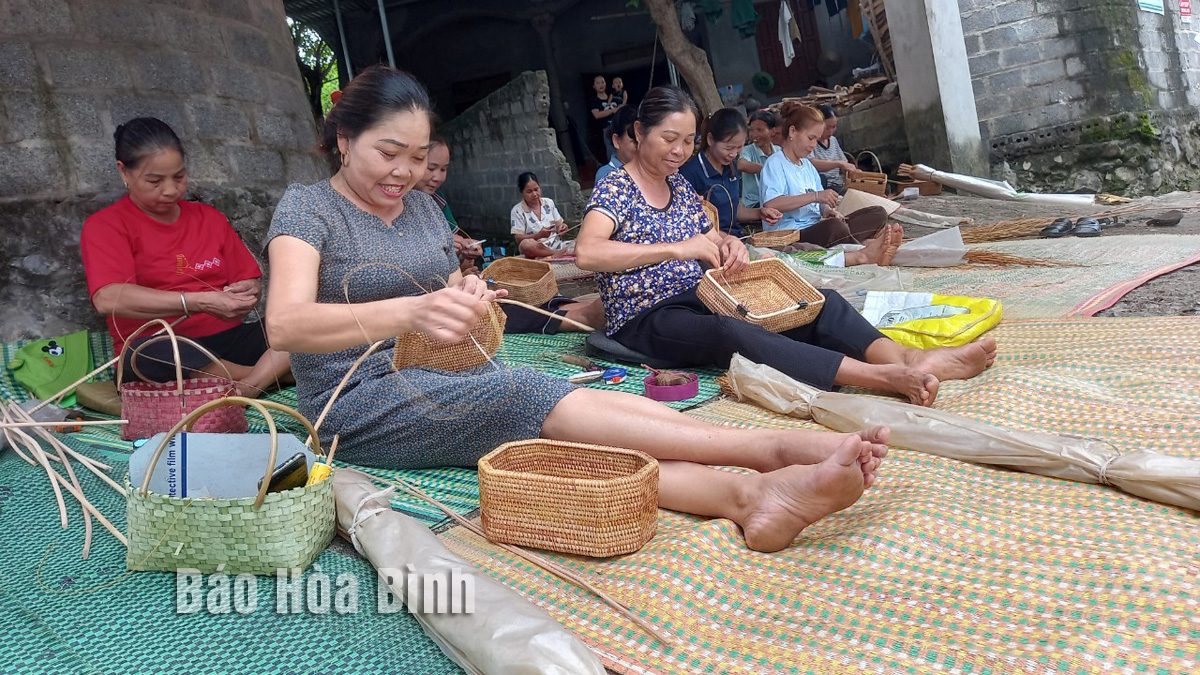
Over recent years, the People's Committee of Lac Son district has implemented various policies to support vocational training in traditional industry cooperatives, especially in ethnic minority areas. As a result, many households have get rid of poverty. Vocational training and startup support projects have also helped create numerous new jobs, increase income for workers, improve living conditions, and create conditions for sustainable development in the ethnic minority areas of the district.

Handicrafts create
jobs for many women in Tre village, Van Nghia commune, Lac Son district.
The culture house in Tre village, Van Nghia commune, Lac Son
district, is now a site for making bamboo and rattan products of the Muong Pheo
Agricultural Trade and Service Cooperative. Every day, about 20 local women
gather here to make handicraft products.
Nguyen Thi Trang in Tre village said that bamboo and rattan
weaving is a traditional craft in the village. In addition to farming, local women
teach each other the craft and then do it. Since the establishment of the
cooperative, they do not have to worry about finding raw materials and selling
products, but just follow the samples. Recently, the demand for handicraft
exports has risen, with increases in orders, so the work has become regular.
For normal workers, in addition to housework, they can each earn 4-5 million
VND (160-200 USD) a month.
Bui Van Lieu, Chairman of the Van Nghia commune People's
Committee, said that currently, the commune has more than 1,600 households with
over 7,000 members whose livelihoods mainly depending on agriculture.
Therefore, expanding the scale of the cooperative, creating jobs, and
increasing income for women are priorities of the locality. The handicraft industry
has generated jobs and helped raise income for many women in the commune. To
encourage the development of cooperatives, local authorities have also created
conditions for them to borrow capital.
In Nhan Nghia commune, the provincial People's Committee in 2017
recognised the Bui traditional craft village, and provided funding to restore
and develop the craft. In 2020, the Bui traditional rattan and bamboo craft
village cooperative was established with 25 members. Since then, local women
have had a more stable source of income, which helps improve their families’
living conditions.
The Standing Board of the Hoa Binh provincial Party Committee has agreed in principle on a proposal by the Standing Board of the Party Committee of Hoa Binh city to gather feedback on the city’s 1:2000 zoning plan, which forms part of its broader urban development strategy.
Hoa Binh province has made notable progress in public administration reform and digital government development, with the satisfaction index among citizens and businesses reaching over 84%, according to recent government evaluations.
Thanks to great efforts by local authorities in recent times, the governance and public administration performance of Mai Chau district has been significantly improved.
In the afternoon of June 6, the Party Committee, the People's Council, the People's Committee and the Fatherland Front of Lac Son district solemnly held a meeting to celebrate the 139th anniversary of the district's founding (1886–2025) and the 79th anniversary of the establishment of the district's Party Committee (1946–2025). There was the attendance of Mr. Bui Van Thang, the Vice Chairman of the Provincial People's Council; Mr. Quach Tat Liem, the Vice Chairman of the Provincial People's Committee; Ms. Dang Bich Ngoc, the Deputy Head of the National Assembly Delegation of the province; as well as the former leaders of the province and district through various periods, who are the natives of the district.
Implementing the Politburo’s Resolution No. 57-NQ/TW on breakthroughs in science – technology, innovation, and digital transformation is a golden opportunity for the northern mountainous province of Hoa Binh to renew growth model, improve competitive edge and shorten digital gap.
Resolution 57-NQ/TW, issued by the Politburo on December 22, 2024, identifies sci-tech, innovation, and digital transformation as strategic breakthroughs to build a developed and prosperous nation. In Hoa Binh province, this spirit is not just a slogan, it’s being put into action through concrete initiatives that form a "new development triangle”: digital citizenship, digital economy, and digital administration.



